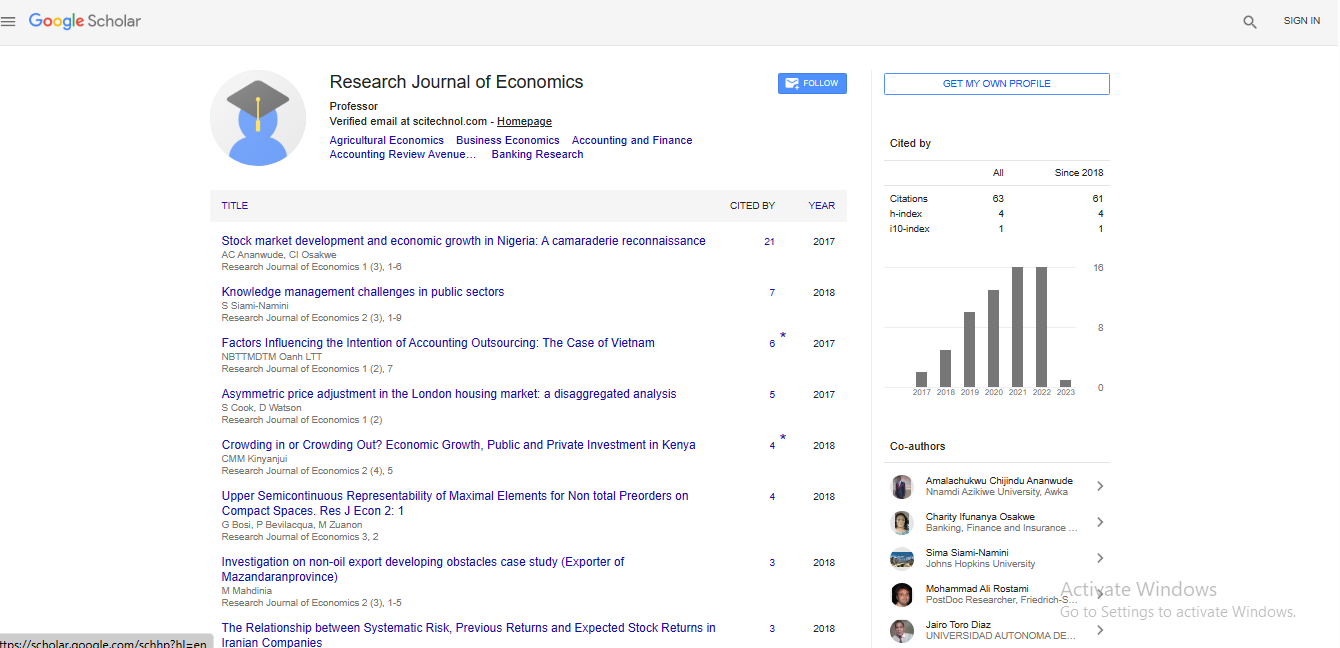Perspective, Res J Econ Vol: 7 Issue: 2
Exploring the Interplay between Monetary Economics and Banking
Christopher Bowdler*
1Department of Economics, Oxford University, Manor Road, Oxford, United Kingdom
*Corresponding Author: Christopher Bowdler
Department of Economics,
Oxford University, Manor Road, Oxford, United Kingdom
E-mail: christopher.bowdler@economics.ox.ac.uk
Received date: 27 February, 2023, Manuscript No RJE-23-97080;
Editor assigned date: 01 March, 2023, Pre QC No. RJE-23-97080(PQ);
Reviewed date: 15 March, 2023, QC No. RJE-23-97080(R);
Revised date: 22 March, 2023, Manuscript No: RJE-23-97080
Published date: 29 March, 2023, DOI: 10.4172/RJE.1000138
Citation: Bowdler C (2023) Exploring the Interplay between Monetary Economics and Banking. Res J Econ 7:2.
Description
Monetary economics and banking are two interrelated fields that play a crucial role in shaping the economy of any country. The study of monetary economics deals with the behavior of individuals and institutions regarding money, while banking is concerned with the activities of financial intermediaries. Together, these two fields form the foundation of modern finance and are essential for the functioning of the global economy. In this manuscript, we will provide an overview of the key concepts and theories of monetary economics and banking. Monetary economics is primarily concerned with the study of the money supply and its effect on the economy. It explores the role of money in facilitating transactions, acting as a store of value and unit of account, and influencing the behavior of economic agents. The study of monetary economics can be traced back to the classical economists, such as Adam Smith and David Ricardo, who recognized the importance of money in the functioning of the economy. In modern times, the study of monetary economics has been greatly influenced by the works of John Maynard Keynes and Milton Friedman. The central bank plays a crucial role in the implementation of monetary policy. Central banks are responsible for setting interest rates, controlling the money supply, and maintaining the stability of the financial system. The effectiveness of monetary policy is often measured by its ability to achieve the goals of price stability, full employment, and economic growth. Banking, on the other hand, is concerned with the intermediation of funds between savers and borrowers. Banks act as financial intermediaries by accepting deposits from savers and lending money to borrowers. This intermediation function is crucial for the functioning of the economy as it helps to allocate resources efficiently. Banks also play a key role in the creation of credit, which is essential for economic growth.
The banking system is regulated to ensure its stability and prevent systemic risks. Regulatory bodies such as the Federal Reserve in the USA, the European Central Bank, and the Bank of Japan are responsible for supervising banks and ensuring that they comply with regulations. The regulatory framework includes capital adequacy requirements, liquidity ratios, and stress tests to ensure that banks have sufficient reserves to withstand financial shocks.
In recent years, there has been a growing concern about the impact of technological innovations on the banking sector. Fintech companies, such as peer-to-peer lending platforms, have emerged as a disruptive force in the industry, challenging the traditional banking model. The rise of cryptocurrencies, such as Bitcoin and Ethereum, has also raised questions about the future of money and the role of central banks.
Conclusion
The monetary economics and banking are two interconnected fields that are essential for the functioning of the economy. The study of monetary economics focuses on the behavior of individuals and institutions regarding money, while banking is concerned with the intermediation of funds between savers and borrowers. Central banks play a crucial role in the implementation of monetary policy, while regulatory bodies ensure the stability of the banking system.
 Spanish
Spanish  Chinese
Chinese  Russian
Russian  German
German  French
French  Japanese
Japanese  Portuguese
Portuguese  Hindi
Hindi 